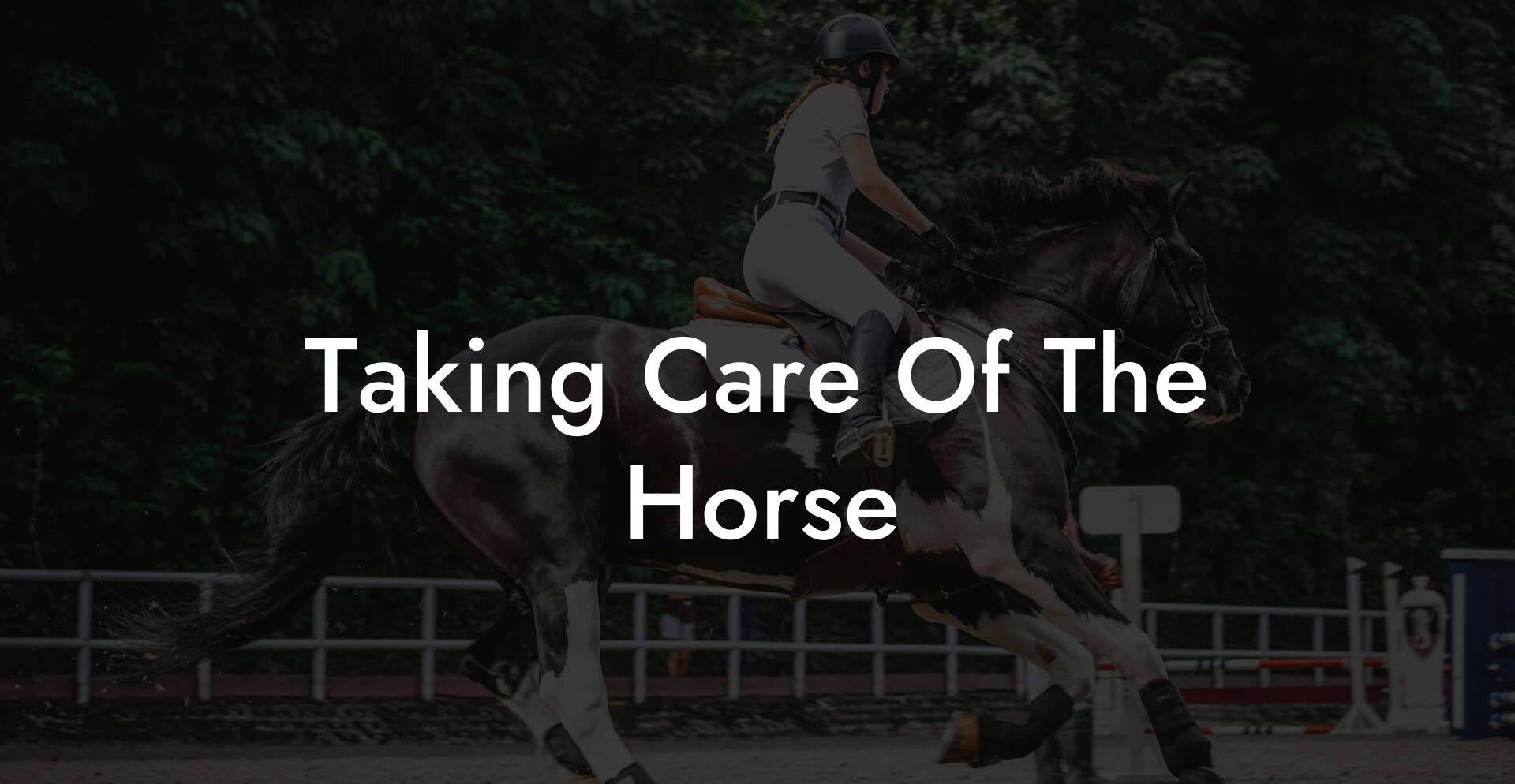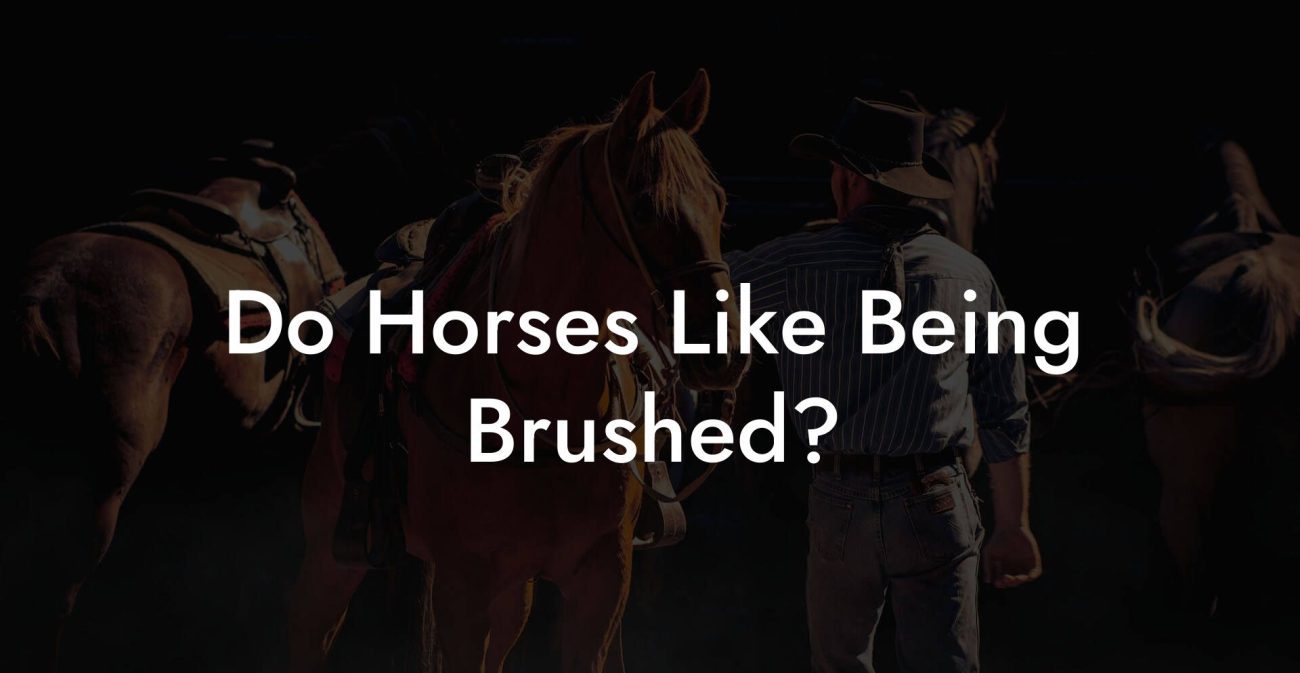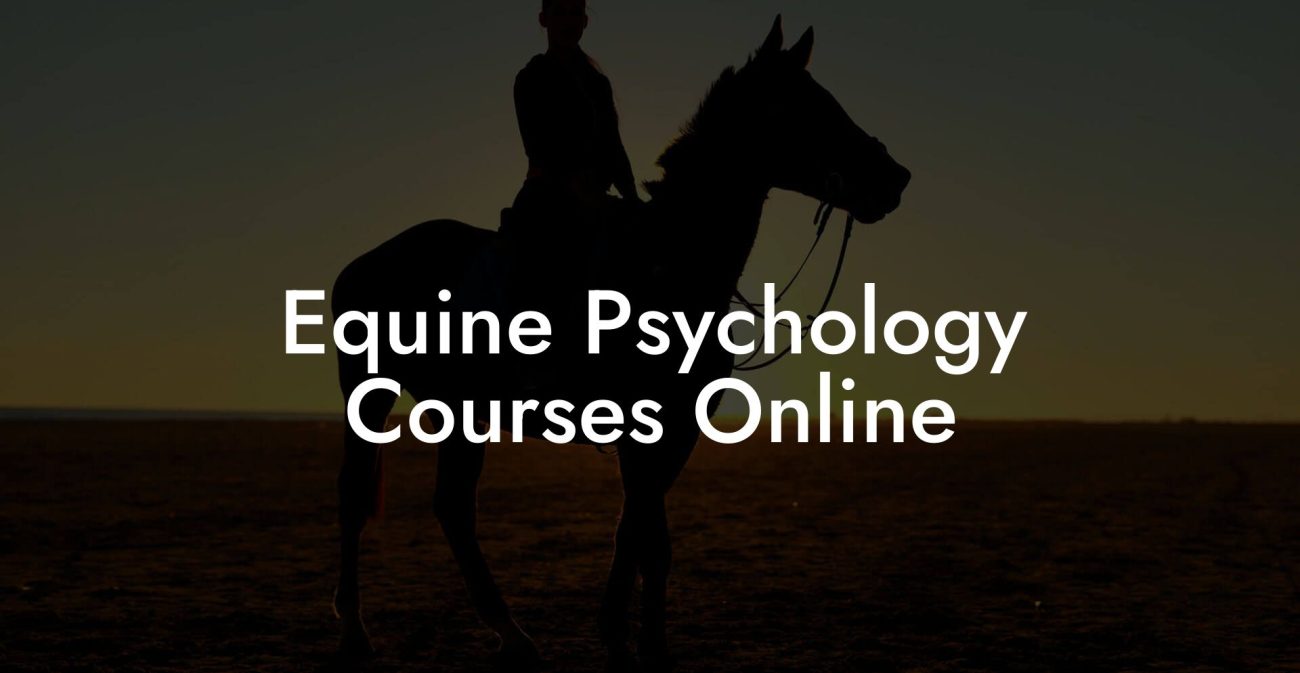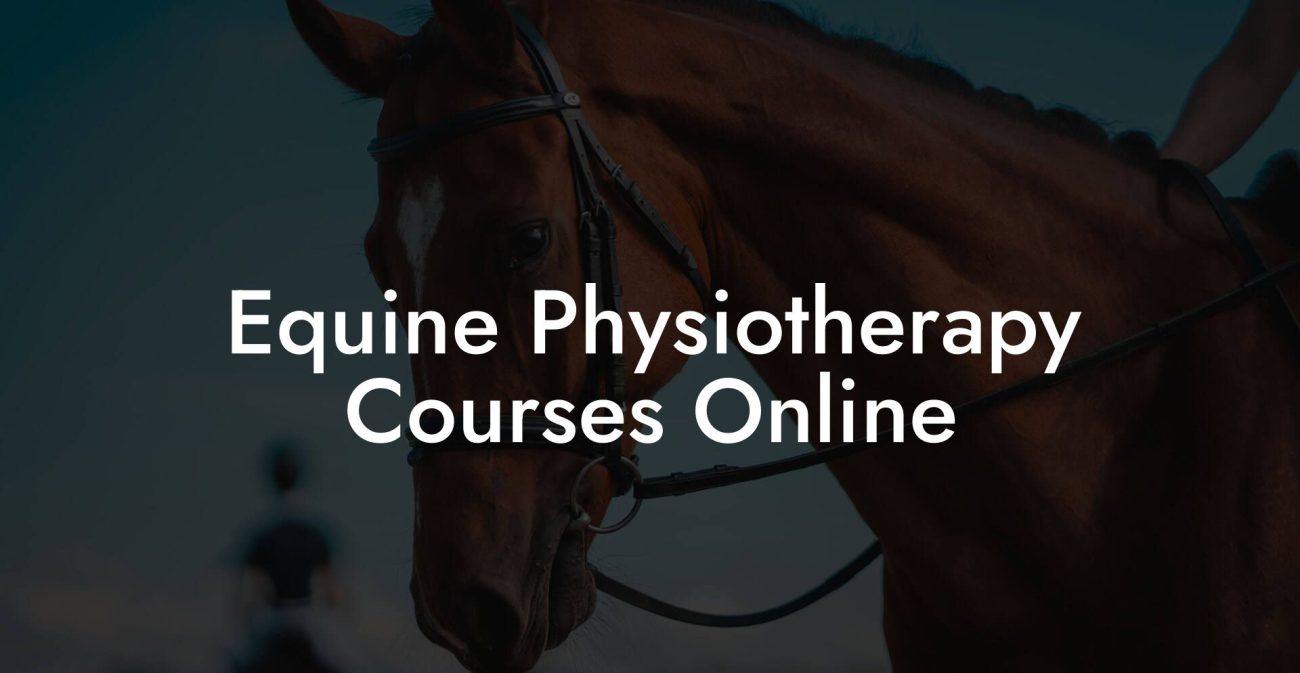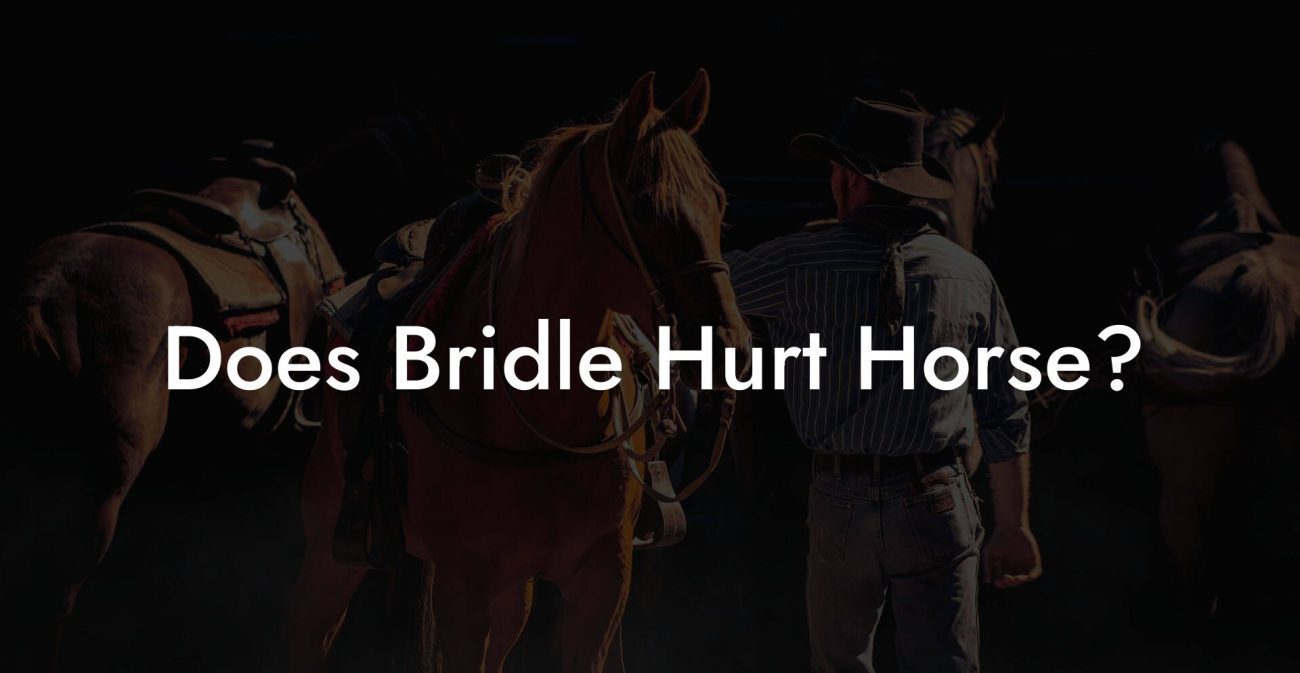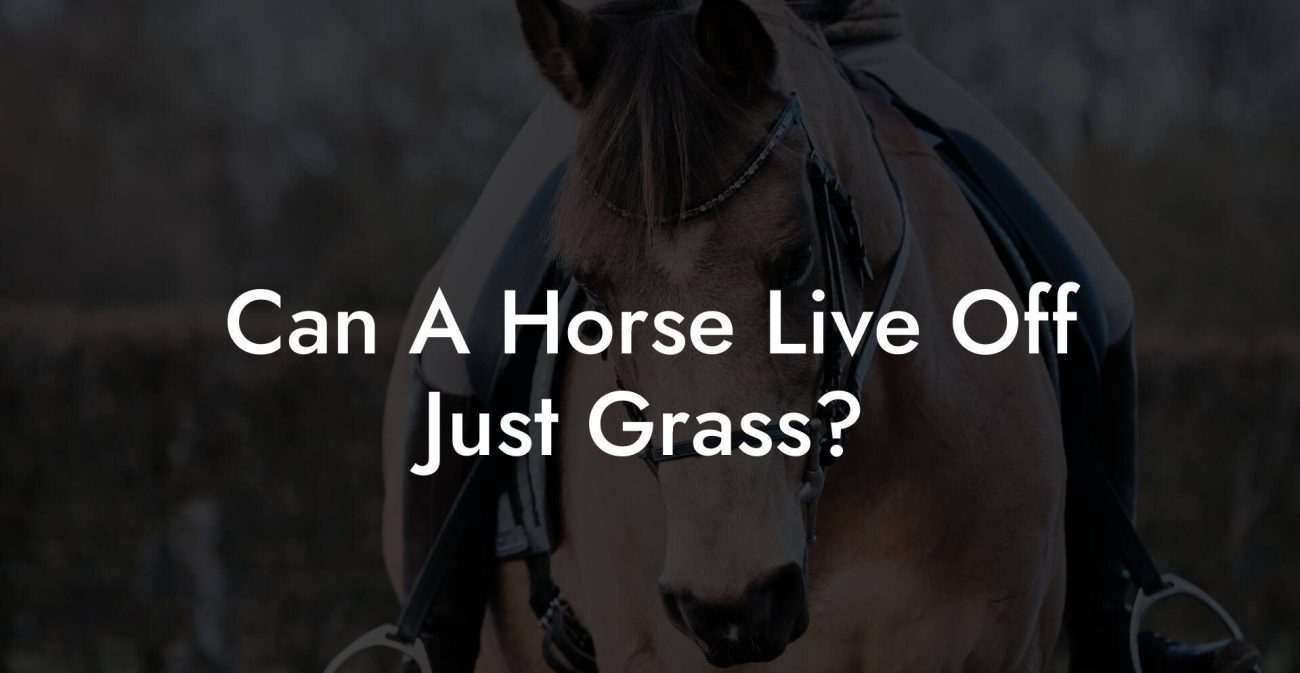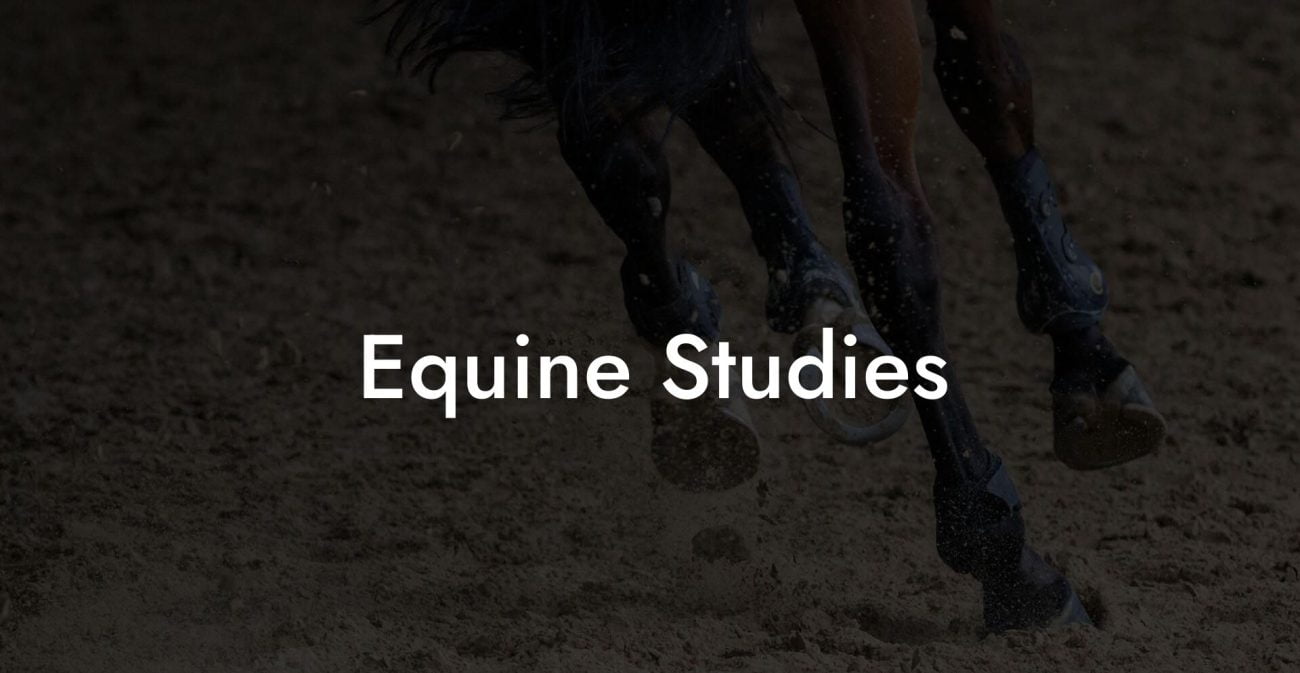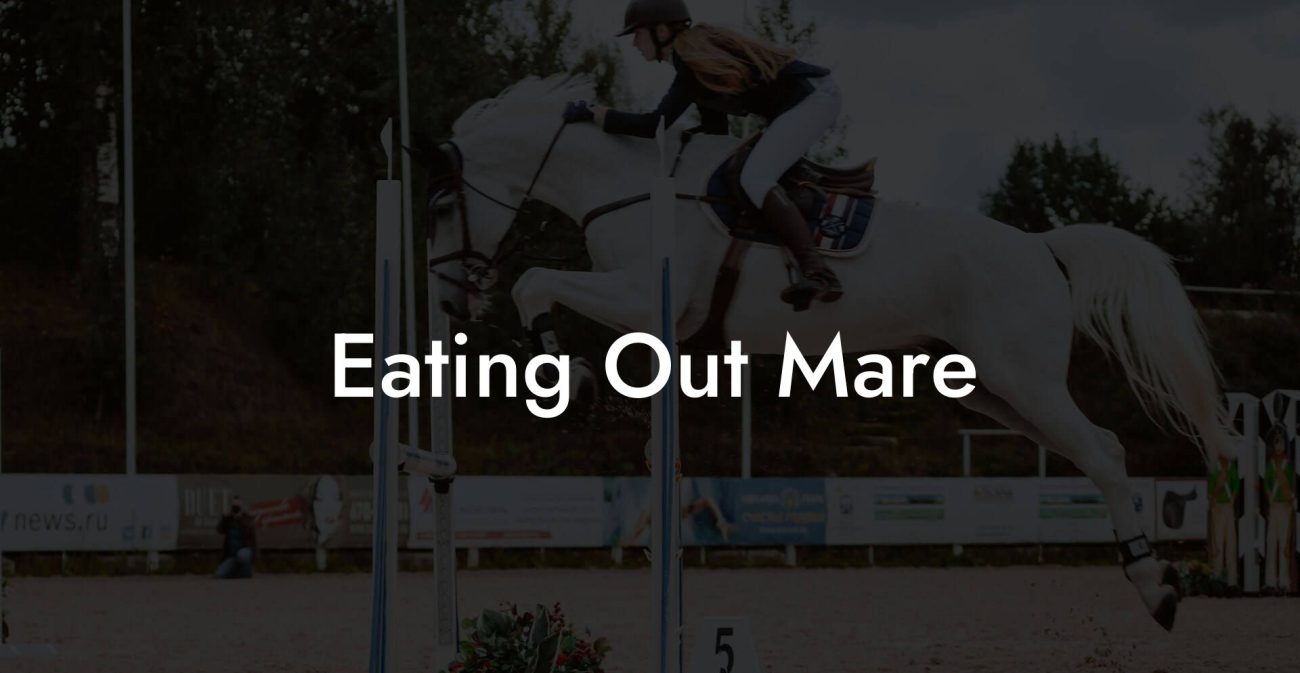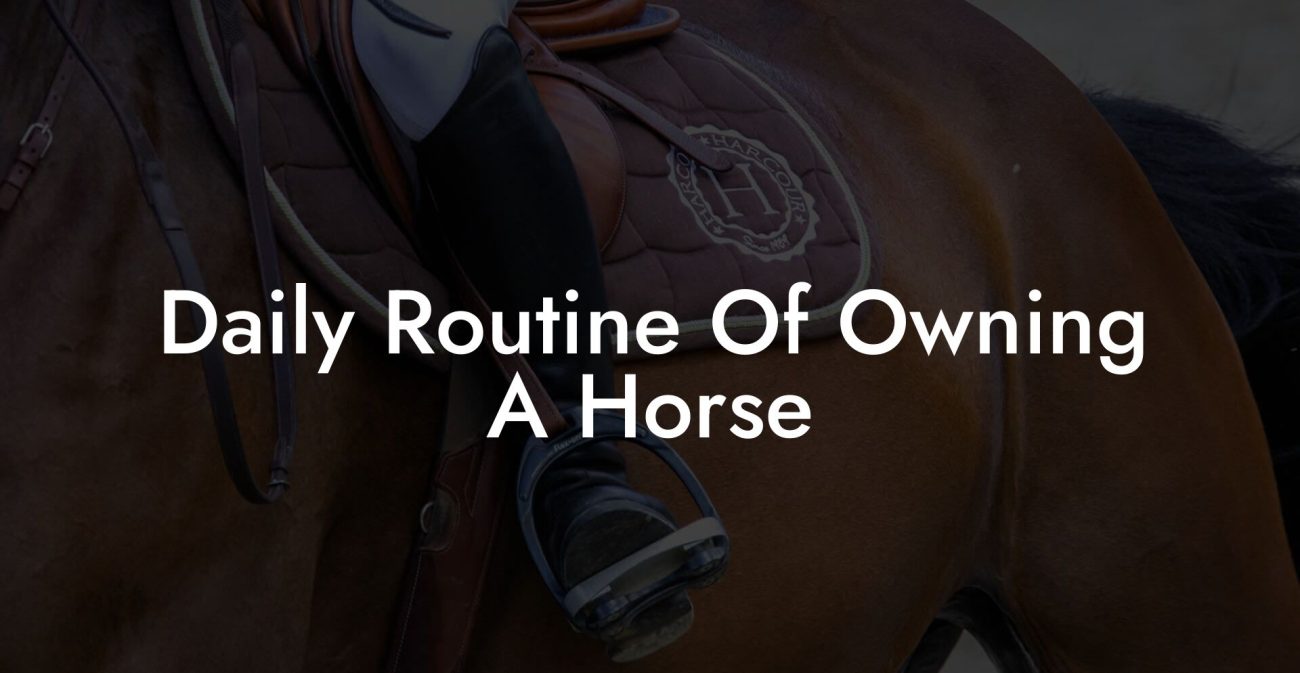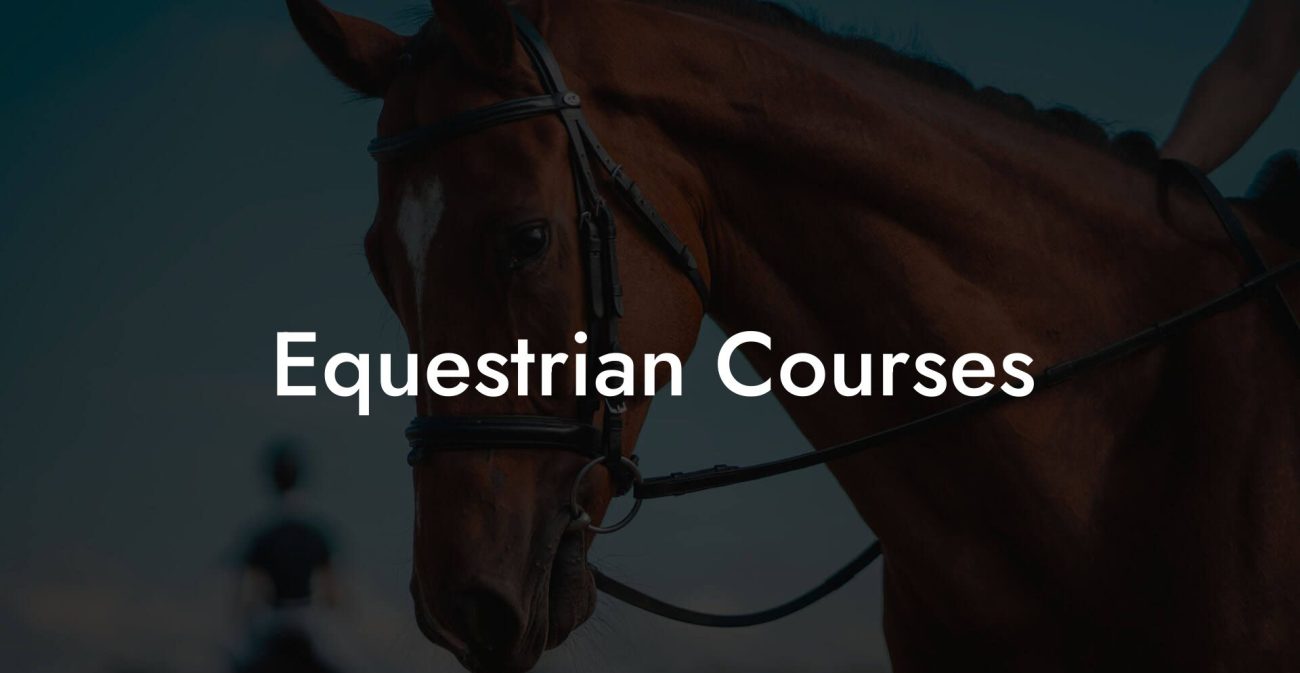When it comes to taking care of your horse, think of it like managing a wild, majestic roommate who happens to gallop and chew hay all day, it’s as rewarding as it is unpredictable! This guide is your ultimate go-to resource for everything horse care, blending practical tips with a spark of humor that speaks directly to the Gen-Z and millennial spirit. We’re talking holistic feeding, grooming hacks, exercise tips, and savvy stable management that’ll have both you and your equine BFF thriving.
Quick Links to Useful Sections
- Understanding Your Equine Companion: The Basics of Horse Care
- Feeding Your Horse for Optimal Health
- Grooming: More Than Just a Pretty Mane
- Exercise and Physical Activity: Keeping Your Horse Fit and Fabulous
- Stable Management and Shelter: Creating a Safe Haven
- Health Check-Ups and Preventive Care: Your Horse’s Wellness Routine
- Integrating Natural and Holistic Practices in Horse Care
- Tech-Savvy Horse Care: Apps, Gadgets, and Digital Tools
- Resources and Community Support: Your Next Steps
- Maintaining a Strong Bond: The Heart of Equine Care
- Seasonal Horse Care: Adapting to Weather and Environment
- Emerging Trends in Horse Care: What’s New in the Stable?
- Integrative Horse Health Case Studies: Real Stories, Real Successes
- Case Study 1: From Neglect to Nurture
- Case Study 2: Tech Meets Tradition
- Case Study 3: Embracing Holistic Healing
- Designing Your Personalized Horse Care Plan
- Step 1: Conduct a Thorough Assessment
- Step 2: Set Clear, Achievable Goals
- Step 3: Integrate Multiple Care Modalities
- Step 4: Build a Routine and Stick With It
- Step 5: Monitor, Adjust, and Celebrate
- Holistic Strategies for Equine Wellness
- Integrative and Holistic Horse Care FAQs: Your Questions Answered
- Your Journey to Masterful, Modern Horse Care
Understanding Your Equine Companion: The Basics of Horse Care
Whether you’re a first-time horse owner or a seasoned equestrian looking to up your game, knowing your horse’s unique needs is key. Horses are social, intelligent creatures with distinct personalities, each one deserves individualized care. In this section, we’ll break down the foundational aspects of horse care, from understanding their behavior and dietary needs to routine grooming and exercise.
Horses are natural grazers that evolved to spend most of their day eating. They need a balanced diet composed of quality forage, grains, and essential supplements to maintain health. Understanding your horse’s body language, mood, and energy levels can help you anticipate their needs, prevent potential health issues, and forge a stronger bond with your magnificent friend.
In addition to physical care, mental stimulation is essential. Horses are intelligent animals, they thrive on social interaction, training, and a stable environment. Whether it’s a gentle grooming session or a spirited trail ride, every interaction is an opportunity to deepen the connection, boost confidence, and ultimately ensure a happy, healthy horse.
Feeding Your Horse for Optimal Health
A well-fed horse is a happy and healthy horse! Feeding your equine companion isn’t as simple as tossing a bucket of hay their way; it requires a balance of quality forage, grains, and proper hydration. In today’s age of integrative and holistic care, many modern horse owners are turning to nutrient-dense feeds, complementing traditional diets with natural supplements to boost vitality.
Forage and Hay: The cornerstone of any horse’s diet is high-quality hay and pasture. Ensure your hay is free from mold and dust and that your horse has constant access to fresh, clean water. Rotational grazing can also help promote a steady diet and provide natural exercise.
Concentrates and Grains: Depending on your horse’s workload, adding grains or concentrated feeds can provide extra energy. However, moderation is key; overfeeding can lead to digestive issues and metabolic disorders. Consider integrating advanced feeds that are formulated to support muscle recovery after strenuous activities.
Supplements and Natural Additives: Modern nutrition often includes supplements like omega-3 fatty acids, vitamins, and minerals. Many Gen-Z and millennial horse enthusiasts are opting for organic formulas, herbal additives, and even probiotics to support gut health. Be sure to consult with your equine nutritionist to tailor a diet specific to your horse’s needs.
By clustering semantic keywords such as “holistic horse nutrition,” “organic equine feed,” and “balanced horse diet” throughout your feeding strategy, you’re not only promoting optimal health but also staying ahead of the curve in modern, well-rounded horse care.
Grooming: More Than Just a Pretty Mane
Grooming your horse is an art form, a bonding ritual that blends care, mindfulness, and a little bit of magic. It’s not just about making your horse look Instagram-ready (although that’s definitely a perk!); it’s about maintaining a healthy coat, balanced skin, and overall comfort.
Brushing Techniques: Regular brushing helps remove dirt, redistribute natural oils, and stimulate blood flow. Use a combination of a curry comb and a soft brush to reach all parts of your horse’s body. Many riders swear by the calming effect of a good grooming session, it’s a meditative experience for both you and your equine friend.
Mane and Tail Care: A well-kept mane and tail are not only aesthetically pleasing but are also signs of a healthy, well-nourished horse. Use detangling sprays and leave-in conditioners to keep hair soft and free of knots. Brushing through these areas also helps you spot any potential issues like lice or skin irritations.
Bathing: Bathtime for a horse is an occasional, yet important, ritual, choose a gentle, pH-balanced shampoo formulated for equine coats. While horses generally don’t like baths as much as a dip in a cool stream, a well-timed wash can help alleviate mild allergies and refresh your horse’s coat.
The keywords “equine grooming tips,” “horse coat care,” and “natural mane maintenance” not only boost your online visibility but ensure that your grooming routine aligns with modern best practices favored by young, discerning horse owners.
Exercise and Physical Activity: Keeping Your Horse Fit and Fabulous
Just like us, our horses need to break a sweat to maintain peak health and performance. Balancing exercise with rest is crucial to preventing injuries and ensuring a balanced, active lifestyle. Whether you’re prepping for a competitive show, a leisurely trail ride, or just a daily trot around the paddock, integrating a thoughtful exercise regimen is key.
Daily Routines: Routine exercise helps maintain muscle tone, joint flexibility, and stamina. Plan a mix of walking, trotting, and cantering sessions according to your horse’s fitness level and workload. Remember, variety not only keeps your horse engaged but also reduces the monotony of repetitive routines.
Warm-Up and Cool-Down: As any athlete will tell you, a proper warm-up is essential. Start with a slow walk or light stretching to prep the muscles, followed by a cool-down period to aid recovery. This practice minimizes the risk of injury and supports overall muscle health.
Trail Rides and Social Exercise: For the adventurous souls, trail rides are exhilarating and stress-relieving. Horses also benefit from social interaction with other equines, group exercises and turnout time are perfect for mental stimulation and physical fitness.
Infusing search-friendly terms such as “horse exercise plans,” “equine fitness routines,” and “holistic horse workouts” into your reading not only supercharges your SEO but ensures your routine is tailored for modern horse care enthusiasts.
Stable Management and Shelter: Creating a Safe Haven
A well-organized stable is the backbone of excellent horse care. Whether you have a sprawling barn or a modest shelter, creating a clean, safe, and comfortable environment is essential for your horse’s well-being.
Cleanliness and Safety: Daily mucking of stalls and regular cleaning are crucial to prevent health hazards such as respiratory issues and infections. Regularly inspect your stable for hazards like loose boards, rusty nails, or sharp objects that might injure your horse.
Ventilation and Lighting: Good ventilation is a must in any stable to reduce ammonia buildup from manure and to provide fresh air. Smart lighting options can create a warm, inviting space that mimics natural daylight, which is particularly appreciated by horses that flourish in sunlit environments.
Supplementary equipment: Consider investing in high-quality bedding materials like deep straw or shavings that provide comfort and insulation. Automatic waterers, reliable feeders, and even temperature control systems are staples of modern stable management.
Danger, dirt, and dullness are out, the SEO-friendly phrases “modern stable management,” “safe equine shelter,” and “clean horse stall tips” ensure that you’re in tune with the latest trends in safe, stylish, and holistic horse care.
Health Check-Ups and Preventive Care: Your Horse’s Wellness Routine
Just like we visit the doctor for our annual check-ups, horses also deserve regular health assessments to keep them in peak condition. Preventive care isn’t just about treating problems as they arise, it’s about forestalling them altogether.
Routine Veterinary Visits: Schedule regular check-ups with a trusted equine veterinarian. These visits should include dental exams, vaccinations, and deworming protocols. A healthy horse is the result of proactive care and intervention before issues become critical.
Farrier Appointments: Regular hoof care is essential. Farriers trim and balance your horse’s hooves every 6-8 weeks, which not only prevents painful issues but also aids in overall mobility.
Monitoring for Subtle Signs: Keep an eye on your horse’s behavior, appetite, and coat condition, changes may signal underlying health concerns. Timely detection of issues like lameness, colic, or skin irritations can save you costly veterinary visits and ensure that your horse continues to live its best life.
Incorporate phrases like “equine preventive care,” “horse wellness check-ups,” and “holistic veterinary care” throughout your management plan to resonate with both search engines and horse owners who value a proactive approach.
Integrating Natural and Holistic Practices in Horse Care
In today’s world, many young horse owners are turning to holistic and integrative practices that blend traditional methods with natural remedies, reflecting an interest in sustainable, organic care. From herbal solutions to alternative therapies, integrating these approaches can enhance your horse’s overall quality of life.
Herbal Remedies: Various herbs such as chamomile, garlic, and aloe vera can be incorporated into topical treatments for minor cuts, insect bites, or skin irritations. These natural remedies reduce inflammation and promote healing without the harsh side effects of synthetic medications.
Aromatherapy and Massage: Just as humans benefit from a good massage after a stressful day, horses can also reap the rewards of regular therapeutic massage. Essential oils like lavender and eucalyptus, when used correctly, may help calm anxious horses while improving circulation and muscle tone.
Acupuncture and Energy Healing: Some modern equine caretakers are exploring acupuncture and Reiki to complement their horse’s medical treatments. These techniques aim to balance the body’s natural energy flow, reduce discomfort, and promote faster recovery from minor injuries or chronic conditions.
By including targeted SEO keywords like “holistic horse care,” “natural equine remedies,” and “integrative horse wellness,” you ensure your approach is as modern as it is effective, perfect for the environmentally conscious, health-savvy millennial and Gen-Z equestrian.
Tech-Savvy Horse Care: Apps, Gadgets, and Digital Tools
The digital age has touched every aspect of our lives, including horse care. From smartphone apps to wearable technology, modern tools are transforming how we monitor, manage, and optimize the health and performance of our equine companions.
Tracking Health Data: Many innovative apps now allow you to log feeding schedules, exercise routines, and vet visits. This digital journaling helps you notice patterns, manage medications, and even share detailed reports with your veterinarian.
Wearable Technology: Devices that monitor vital signs, activity levels, and sleep patterns are becoming popular in equine sports. These gadgets provide real-time data that can help tailor your horse’s exercise regimen and detect early signs of discomfort or illness.
Online Communities: Engage with a thriving community of like-minded horse caretakers through social media, forums, and specialized apps. These platforms offer a wealth of shared experiences, advice, and even live Q&A sessions with equine experts.
Infusing relevant keywords such as “digital equine care,” “horse care apps,” and “tech-savvy stable management” not only enhances your SEO presence but resonates with the tech-friendly, modern approach favored by today’s equestrian enthusiasts.
Resources and Community Support: Your Next Steps
No journey in horse care should be a solo ride. There is a vast community of experts, enthusiasts, and resources eager to support you every step of the way. Whether you’re searching for advanced training tips, struggling with a dietary dilemma, or simply looking to swap stories and advice, the equestrian community is here for you.
Online Forums and Social Media Groups: Join dynamic online communities on platforms like Facebook, Reddit, and Instagram, where you can connect with fellow horse owners, share experiences, and get advice in real time.
Workshops and Webinars: Look out for local and online events hosted by equine experts. These sessions can provide valuable insights into everything from equine nutrition and advanced grooming techniques to the latest in digital tracking technology.
Local Equine Clubs & Associations: Becoming part of a local horse club or association can offer hands-on experiences, mentoring opportunities, and access to exclusive training resources. These networks foster community engagement and a shared passion for holistic horse care.
Trusted Books and Online Publications: Expand your knowledge with the help of well-reviewed books, online articles, and blogs that cater to modern horse care. Seek out sources that specialize in organic feeding, natural remedies, and tech-enhanced management strategies.
With the right community and resources on your side, you’re not just caring for your horse, you’re joining a movement of informed, empowered, and innovative caretakers who are rewriting the rulebook on equine well-being.
Maintaining a Strong Bond: The Heart of Equine Care
Beyond the science, the feeds, and the tech, at the core of every great horse care regimen lies one essential element: the bond between you and your horse. This relationship is built on trust, respect, and plenty of shared adventures. Whether you’re riding through open fields or simply having a quiet moment while grooming, each experience is an opportunity to connect on a deeper level.
Treat every interaction as a moment to nurture this bond. Spend extra time during grooming sessions to talk softly, pat reassuringly, and observe your horse’s subtle cues. This empathy not only makes your horse feel valued and loved; it can significantly improve behavioral responses during training and even reduce stress.
The symbiotic relationship you share is equally vital to both of your well-beings. With enhanced understanding, you’ll be better positioned to anticipate needs, tailor your care strategies, and create lasting memories filled with laughter and mutual respect.
Seasonal Horse Care: Adapting to Weather and Environment
Just like we switch our wardrobe for winter and summer, horses require adjustments in care to match the seasons. Whether it’s battling the chill of a frosty morning or managing the heat of a blazing summer day, a proactive approach to seasonal horse care is a must.
Winter Care: During colder months, focus on ensuring your horse has access to a well-insulated shelter and quality bedding. Increase their caloric intake with extra forage to help generate body heat. Regular grooming is also vital to remove frost and to detangle resistant winter coats.
Summer Care: Hot weather means plenty of fresh water, cool shade, and lighter feeds. Monitor your horse for signs of heat stress, and consider adding electrolytes to their water. With technology on your side, tracking water intake and activity during sweltering weather can help dial in the perfect summer care plan.
Spring and Fall Transitions: These are prime times for maintenance and preventive care. Use these seasons to evaluate your horse’s health, update dietary supplements, and tweak exercise routines as the environmental demands shift.
By incorporating key phrases like “seasonal equine care,” “winter horse maintenance,” and “summer stable tips,” you can ensure that your care practices stay both optimized for search engines and finely tuned for your horse’s evolving needs.
Emerging Trends in Horse Care: What’s New in the Stable?
The world of horse care is evolving, and new trends are emerging that resonate with the modern equestrian lifestyle. Today’s innovations are influenced by the digital era, eco-conscious living, and a renewed focus on holistic wellbeing.
Eco-Friendly Practices: Sustainable stable management is on the rise. From eco-friendly bedding materials to solar-powered water systems and organic feed options, many young horse lovers are embracing practices that benefit both their animals and the planet.
Wearable Tech for Horses: As mentioned earlier in our tech-savvy section, wearable technology is continually growing more sophisticated. Advanced monitoring systems now provide detailed insights that help avert potential issues before they escalate.
Customized Health Plans: The integration of personalized medicine for horses is a trend taking off. With genetic testing and advanced diagnostics, equine veterinarians can tailor health plans specific to your horse’s biometric data, a true reflection of modern, integrative horse care.
Searching for terms such as “innovative horse care techniques,” “eco-friendly stable solutions,” and “personalized equine health” on your favorite search engine will reveal a wealth of new tools and ideas that can help keep your horse’s care plan on the cutting edge.
Integrative Horse Health Case Studies: Real Stories, Real Successes
Nothing demonstrates the power of a thoughtful, integrative approach to horse care like real-life examples. In this section, we highlight a few case studies from horse owners who have transformed their care routines and witnessed a remarkable positive change in their equine companions.
Case Study 1: From Neglect to Nurture
Sarah, a passionate millennial rider, inherited an old farm horse with a history of neglect. Determined to give him a second chance at life, she revamped his diet with organic feed, integrated regular exercise, and embraced natural supplements. With regular grooming, daily bonding time, and modern digital tracking of his progress, her once downtrodden horse blossomed into a lively, well-mannered companion. Her story is a testament to how consistent, integrative care can transform even the most challenging cases.
Case Study 2: Tech Meets Tradition
Jamal, a Gen-Z tech aficionado and avid rider, combined his love for technology with traditional equine care. By utilizing wearable devices that tracked everything from heart rate to activity levels, and pairing this data with a balanced, anti-inflammatory diet, his horse’s performance in competitive riding improved markedly. Jamal’s modern approach, blending the best of both worlds, underscores that innovation and tradition can work hand in hand to elevate horse care.
Case Study 3: Embracing Holistic Healing
Rebecca, who always believed in the healing power of nature, integrated acupuncture and massage alongside her regular veterinary routines. Her horse, previously plagued by recurring joint issues, began showing signs of improved mobility and overall energy. By weaving together conventional treatments with holistic practices, Rebecca not only boosted her horse’s quality of life but also deepened the trust between them.
These stories highlight that no matter your background or approach, a thoughtful, comprehensive strategy can yield transformative results in horse care.
Designing Your Personalized Horse Care Plan
Just as every horse is unique, so should be your approach to caring for them. A personalized care plan considers not only the physical needs of your horse but also its personality, environment, and your lifestyle. Here are some practical steps to design a comprehensive plan that fits your unique situation:
Step 1: Conduct a Thorough Assessment
Begin by evaluating every aspect of your horse’s life, diet, exercise habits, behavior, and health status. Consulting with your veterinarian and equine nutritionist can provide valuable insights and help fill in the gaps. Use digital tracking tools and wellness apps to log data over several weeks.
Step 2: Set Clear, Achievable Goals
Whether your focus is improved fitness, enhanced coat condition, reduced joint strain, or simply a stronger bond, setting measurable and realistic goals is the cornerstone of any effective care plan.
Step 3: Integrate Multiple Care Modalities
Combine traditional methods like routine veterinary check-ups and regular farrier visits with modern practices such as digital monitoring, eco-friendly feeding, and natural therapies like massage or acupuncture. Mix and match elements that resonate with both your values and your horse’s specific needs.
Step 4: Build a Routine and Stick With It
Consistency is key. Establish a daily routine that includes time for feeding, exercise, grooming, and mental stimulation. Use reminders, checklists, or mobile apps to help you stay on track.
Step 5: Monitor, Adjust, and Celebrate
Keep a detailed journal documenting progress, setbacks, and milestones. Regularly review your care plan and make necessary adjustments. Celebrate small victories along the way, whether it’s a shinier coat, a more energetic trot, or improved behavior, these are all signs of progress!
Integrating strategic SEO phrases such as “custom equine care plan,” “personalized horse health strategy,” and “integrative horse management tips” not only helps you reach a wider audience online but ensures your plan aligns with modern, data-driven trends in horse care.
Holistic Strategies for Equine Wellness
Holistic care goes beyond the basics to encompass every aspect of your horse’s well-being, physical, mental, and even emotional. By adopting a multi-dimensional approach, you’re setting the stage for long-term health and resilience.
Incorporate stress-reducing routines like quiet periods in the paddock, soft music during grooming sessions, or even aromatherapy to promote calm in your stable. Encourage play and social interactions among horses, and consider a regular schedule of enrichment activities such as puzzle feeders or obstacle courses.
With an eye toward optimization and SEO, keywords like “holistic equine wellness,” “integrative horse care strategies,” and “comprehensive horse health” help target modern equine enthusiasts seeking a multi-faceted approach that celebrates every dimension of horse care.
Integrative and Holistic Horse Care FAQs: Your Questions Answered
We know you might still have a few burning questions while planning out the best way to care for your horse. Here are some frequently asked questions to clarify common concerns about integrative horse care:
1. What does a holistic approach to horse care involve?
A holistic approach includes all aspects of your horse’s life, nutrition, exercise, grooming, mental stimulation, and environmental management, integrating traditional practices with modern, alternative therapies.
2. How often should my horse have a veterinary check-up?
Regular check-ups should be scheduled at least once a year, though many horses benefit from more frequent visits if they are active, have special dietary needs, or present early signs of potential issues.
3. Can natural supplements really improve my horse’s health?
Yes, many natural supplements, such as omega-3 fatty acids, herbal extracts, and probiotics, can help reduce inflammation and support muscle recovery when properly integrated into their diet.
4. How do I ensure my horse is getting enough exercise?
Implementing a balanced routine that mixes walking, trotting, and cantering, along with pasture turnout and trail rides, will help maintain your horse’s fitness and mental well-being.
5. What are some eco-friendly practices in modern stable management?
Eco-friendly practices include using sustainable bedding materials, implementing solar-powered water systems, and choosing organic feed options to create a healthier environment for your horse and the planet.
6. How can technology enhance traditional horse care?
Digital tools such as health tracking apps, wearable technology, and online forums can provide real-time insights and community support, helping you optimize your horse’s health routines and connect with other enthusiasts.
7. Is it necessary to use both traditional and holistic methods?
Combining traditional practices with holistic methods addresses every facet of your horse’s well-being, creating a balanced and effective approach to long-term health.
8. What should I do if my horse has a special dietary need?
Consult with an equine nutritionist to tailor a diet that addresses specific needs, whether that’s for allergies, metabolic issues, or enhanced performance, ensuring nutrient-rich, balanced meals.
Your Journey to Masterful, Modern Horse Care
Embracing the full spectrum of horse care, from nutrient-rich feeding routines to integrative wellness practices, means more than just maintenance; it’s about embarking on an ongoing adventure of discovery and connection. Every grooming session, every trail ride, and even every digital report you check on your horse’s wellbeing is a step toward a deeper, more fulfilling bond.
By balancing traditional methods with modern innovations and holistic practices, you’re ensuring that your horse lives not only a healthy life but one full of joy and spiritual resonance. Whether you’re tackling seasonal challenges, joining new equine communities, or simply enjoying the ride, let every moment remind you of the power of integrative care.
So saddle up, embrace the art of modern horse care, and celebrate the incredible partnership you share with your equine companion. Your journey toward a thriving, connected stable is just beginning, enjoy the ride!
In a world where technology meets tradition and science intertwines with nature, your approach to horse care becomes a vibrant tapestry of knowledge, empathy, and innovation. Step confidently into this future and let every stride be powered by passion and mastery.

